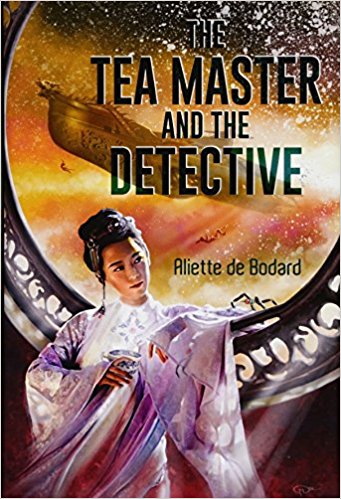 The Tea Master and the Detective (The Universe of Xuya) by Aliette de Bodard
The Tea Master and the Detective (The Universe of Xuya) by Aliette de Bodard Format: ebook
Source: purchased from Amazon
Formats available: hardcover, ebook
Genres: mystery, science fiction
Series: Universe of Xuya
Pages: 96
Published by Subterranean Press on March 31, 2018
Purchasing Info: Author's Website, Publisher's Website, Amazon, Barnes & Noble, Kobo, Bookshop.org
Goodreads
Welcome to the Scattered Pearls Belt, a collection of ring habitats and orbitals ruled by exiled human scholars and powerful families, and held together by living mindships who carry people and freight between the stars. In this fluid society, human and mindship avatars mingle in corridors and in function rooms, and physical and virtual realities overlap, the appareance of environments easily modified and adapted to interlocutors or current mood.
A transport ship discharged from military service after a traumatic injury, The Shadow's Child now ekes out a precarious living as a brewer of mind-altering drugs for the comfort of space-travellers. Meanwhile, abrasive and eccentric scholar Long Chau wants to find a corpse for a scientific study. When Long Chau walks into her office, The Shadow's Child expects an unpleasant but easy assignment. When the corpse turns out to have been murdered, Long Chau feels compelled to investigate, dragging The Shadow's Child with her.
As they dig deep into the victim's past, The Shadow's Child realises that the investigation points to Long Chau's own murky past--and, ultimately, to the dark and unbearable void that lies between the stars...
My Review:
The Nebula Awards shortlist came out this week. I was reminded to take a look at it by someone on the Library Journal Committee that picked the best SF and Fantasy for 2018 for their annual wrap-up because four of our picks are on the Nebula shortlist, as well as a couple of titles that ALMOST made it.
Looking at the list, I noticed a book that I picked up a while ago, as it was recommended in the context of being an “out of this world” Sherlock Holmes pastiche. It has been said that every generation reinvents Sherlock Holmes for themselves, and The Tea Master and the Detective definitely qualifies as one of the more inventive futuristic reinventions, right up there with Sara Holmes and Janet Watson of A Study in Honor.
In The Tea Master and the Detective, we have a tale set in this author’s loosely connected Universe of Xuya series. It’s an alternate history universe where China discovered America before Christopher Columbus. That discovery altered the history of the world, as such a momentous change would. China turned outward instead of inward, and seems to have become the dominant power on Earth before humanity reached the stars.
An influence that is still felt at the time of this story, probably taking place somewhere in the alternate 22nd century – if not later. (The series is made up of short stories and novellas, and they have been scattered in publication throughout every magazine currently publishing SF and Fantasy. I wish they were all collected somewhere because I’d like to read them ALL!)
As I have not yet read the series, I came into this story with no previous knowledge – and I absolutely loved it. While the entire history of the universe isn’t explained – and it shouldn’t be – this little gem still feels complete. I just want to know more. (I always want to know more.)
The detective, in this case the mysterious Long Chau, claims to be writing a thesis on the decomposition of bodies in the deep places of space. Places that seem to be both theoretical and real, although a bit more of each of those elements than might be presupposed at first glance.
The thing about the deep places is that they are both real and unreal, and the unreality of those places affects the human mind – to its detriment. Humans usually travel those deep places safely within the bounds of a ship controlled by a “shipmind”. A ship that is self-aware.
What makes this story so interesting is that the “Watson” to Long Chau’s “Holmes” is a damaged shipmind named The Shadow’s Child who is psychologically unable to travel the deep places – so she makes her living brewing teas that help humans survive the unreality of the places she no longer feels able to go.
Long Chau goes to the fringes of the deep places to find a dead body. But what she’s really looking for is a lost soul. Her own. That she also finds the soul of the scarred shipmind forges a unlikely partnership.
One I hope to see again.
Escape Rating A: This is lovely. It combines two ideas that really shouldn’t have much to do with each other, but work together anyway – much as the two protagonists really shouldn’t have much to do with each other.
Shipminds are people. And this society has places for them and recognizes them as people. The Shadow’s Child has to deal with many of the things that anyone else does, including meddling family members and paying the rent. She will also remind readers of Anne McCaffrey’s classic stories of the brainship Helga, The Ship Who Sang.
The Shadow’s Child is the Watson to Long Chau’s Holmes. The pastiche part of this story is fairly subtle – if you’re not interested, it’s not there. If you are interested, the way that Long Chau refers to herself as a “consulting detective”, her endless deductions of what people, including shipminds, are thinking, feeling and doing as well as her constant use of drugs to stimulate her mind are there to remind readers of some of Sherlock Holmes’ habits, both the more and the less savory of them.
The case that they ultimately find themselves on is an investigation that no one wants solved – and it nearly gets them both killed. But along the way they learn to respect if not necessarily trust each other, and we get to explore a fascinating universe that has plenty of stories in it that are worth telling.
I look forward to ferreting out more of this series as soon as possible!

 Polaris Rising (Consortium Rebellion, #1) by
Polaris Rising (Consortium Rebellion, #1) by 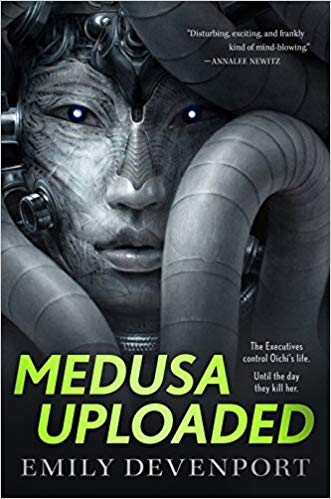 Medusa Uploaded (The Medusa Cycle, #1) by
Medusa Uploaded (The Medusa Cycle, #1) by 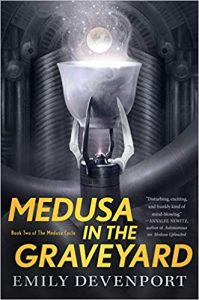 Back to the list I began earlier…
Back to the list I began earlier…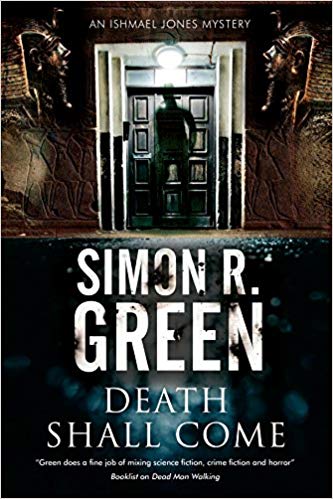 Death Shall Come by
Death Shall Come by 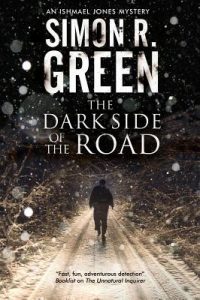 In previous books in this series, the creepy misdirection has either been ghosts (
In previous books in this series, the creepy misdirection has either been ghosts (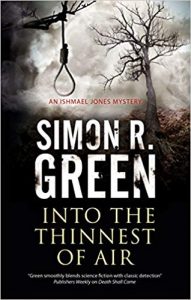 In the end, that’s what flips this series from mystery/horror to science fiction. Mummies don’t walk, but strange, weird and dangerous things do fall out of the sky. Ishmael should know – after all, he’s one of them.
In the end, that’s what flips this series from mystery/horror to science fiction. Mummies don’t walk, but strange, weird and dangerous things do fall out of the sky. Ishmael should know – after all, he’s one of them.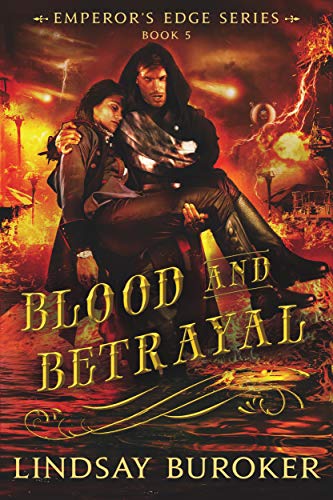 Blood and Betrayal (The Emperor's Edge, #5) by
Blood and Betrayal (The Emperor's Edge, #5) by  Back in 2013 I started the
Back in 2013 I started the 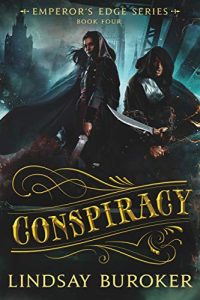 Escape Rating A: It’s been 5 years since I read the previous book in this series, but as soon as I started this one (admittedly after re-reading my reviews of the previous four) I fell right back into this world and was just as caught up in the interpersonal dynamics of this terrifically odd assortment of people as I was back then.
Escape Rating A: It’s been 5 years since I read the previous book in this series, but as soon as I started this one (admittedly after re-reading my reviews of the previous four) I fell right back into this world and was just as caught up in the interpersonal dynamics of this terrifically odd assortment of people as I was back then. With his reputation as a fop – a reputation he encourages at every turn – Maldynado finds it difficult to take charge of anything. His actions in this story give him a surprising chance to step out from Amaranthe’s comfortable shadow to stand in the light for a change – a position from which he generally gets shot at. A not uncommon scenario for everyone in Amaranthe’s orbit!
With his reputation as a fop – a reputation he encourages at every turn – Maldynado finds it difficult to take charge of anything. His actions in this story give him a surprising chance to step out from Amaranthe’s comfortable shadow to stand in the light for a change – a position from which he generally gets shot at. A not uncommon scenario for everyone in Amaranthe’s orbit!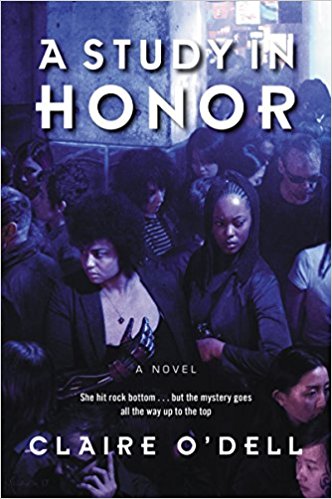 A Study in Honor (The Janet Watson Chronicles #1) by
A Study in Honor (The Janet Watson Chronicles #1) by  Which also means that in addition to the many indignities visited upon Janet Watson because she’s a wounded veteran, even more are heaped upon her because she’s black and because she dared to aspire to a profession that some people still believe should have been reserved for whites. And where the lesbianism of both of the protagonists just adds yet another layer of potential for prejudice.
Which also means that in addition to the many indignities visited upon Janet Watson because she’s a wounded veteran, even more are heaped upon her because she’s black and because she dared to aspire to a profession that some people still believe should have been reserved for whites. And where the lesbianism of both of the protagonists just adds yet another layer of potential for prejudice. Edge of Eon (Eon Warriors #1) by
Edge of Eon (Eon Warriors #1) by  But what really sells the story are the characters. We empathize with Eve and the rock and the hard place she’s caught between. Unfortunately it is also all too easy to see how a hide-bound bureaucracy turns into an “old soldier’s club” where children of the elite accrue favors they have not earned and people like Eve get the shaft. Or the cell.
But what really sells the story are the characters. We empathize with Eve and the rock and the hard place she’s caught between. Unfortunately it is also all too easy to see how a hide-bound bureaucracy turns into an “old soldier’s club” where children of the elite accrue favors they have not earned and people like Eve get the shaft. Or the cell.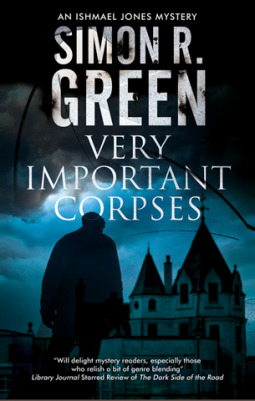 Very Important Corpses (Ishmael Jones, #3) by
Very Important Corpses (Ishmael Jones, #3) by 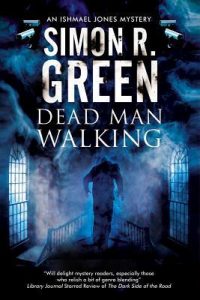 Escape Rating B+: Like all of the books in this series so far, Very Important Corpses was a whole lot of creepy fun. It is very definitely horror-adjacent, which makes it just the right book to review for Halloween.
Escape Rating B+: Like all of the books in this series so far, Very Important Corpses was a whole lot of creepy fun. It is very definitely horror-adjacent, which makes it just the right book to review for Halloween.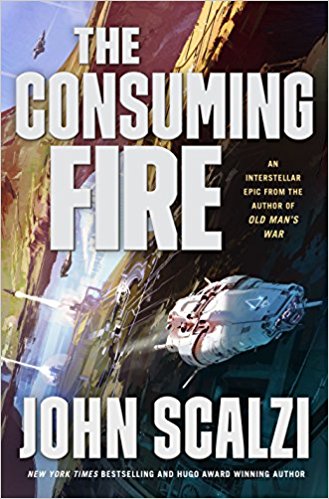 The Consuming Fire (The Interdependency #2) by
The Consuming Fire (The Interdependency #2) by 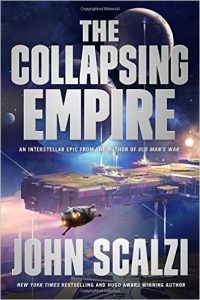 But it isn’t. The Flow is collapsing – hence the title of the first book in the series,
But it isn’t. The Flow is collapsing – hence the title of the first book in the series, 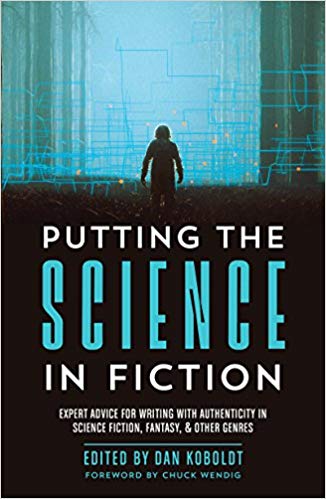 Putting the Science in Fiction: Expert Advice for Writing with Authenticity in Science Fiction, Fantasy, & Other Genres by by Dan Koboldt, Chuck Wendig , Gareth D. Jones, Bianca Nogrady, Kathleen S. Allen, Mike Hays, William Huggins, Abby Goldsmith, Benjamin Kinney, Danna Staaf, Sylvia Spruck Wrigley, Judy L. Mohr, Anne M. Lipton, Jamie Krakover, Rebecca Enzor, Stephanie Sauvinet, Philip Kramer, Gwen C. Katz
Putting the Science in Fiction: Expert Advice for Writing with Authenticity in Science Fiction, Fantasy, & Other Genres by by Dan Koboldt, Chuck Wendig , Gareth D. Jones, Bianca Nogrady, Kathleen S. Allen, Mike Hays, William Huggins, Abby Goldsmith, Benjamin Kinney, Danna Staaf, Sylvia Spruck Wrigley, Judy L. Mohr, Anne M. Lipton, Jamie Krakover, Rebecca Enzor, Stephanie Sauvinet, Philip Kramer, Gwen C. Katz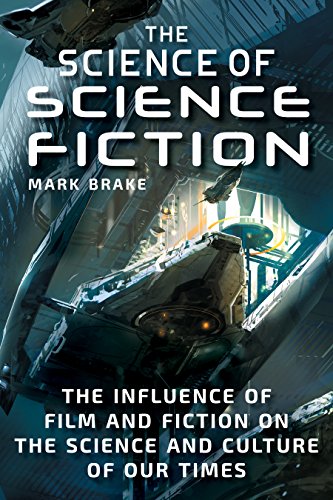 The Science of Science Fiction: The Influence of Film and Fiction on the Science and Culture of Our Times by Mark Brake
The Science of Science Fiction: The Influence of Film and Fiction on the Science and Culture of Our Times by Mark Brake